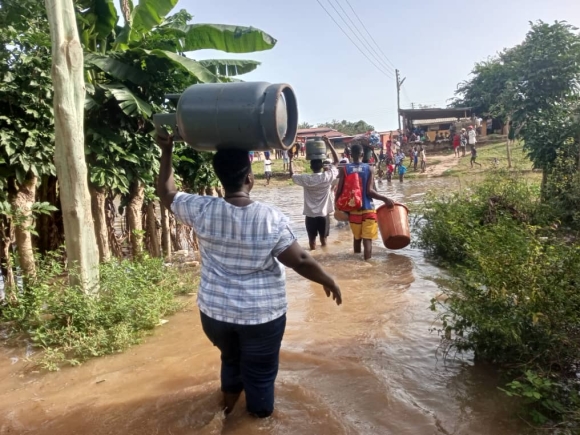The University Teachers Association of Ghana (UTAG) has made a number of recommendations to the government and government agencies to deal with the impact of the flood that hit parts of the Volta region following the spillage of water from the Akosombo and Kpong Dams.
UTAG commissioned a team to assess the flood situation and its impact on education. The team visited all the affected areas as part of its fact-finding mission.
The emotional and psychological impact of the disaster on students was examined by the team.
“The participants were unanimous that they constantly live in fear. They were concerned about the fear of the flood occurring again. Others were anxious about the effect the continuous closure of the schools was going to have on their academic achievements. A boy in one of the groups articulated the concerns of the group when he wondered if they were going to catch up for the period of contact hours lost and whether the Ministry of Education was going to give them special dispensation to recover the lost period.
“Another traumatic experience for the students was the fear of the flood coming again. ‘We are always afraid when we see the clouds gathering. I always ask my mum whether the flood is coming again.’ These sentiments were re-echoed in the other FGD. The emotional and psychological impact of experiencing the flood disaster affected students’ ability to concentrate and engage in meaningful learning,” the assessment report said.
Following the assessment, UTAG has made a number of recommendations.
It said the National Disaster Management Organisation (NADMO), Non-governmental Organisations (NGOs) and other relevant stakeholders who make food donations to the flood victims should consider diversifying the kinds of foods they provide to meet the nutritional needs of the victims so as not to aggravate the existing poor nutrition situation of children under five years and other vulnerable groups in the communities.
“The Ghana Health Service in the District should provide basic health screening services. Continuous nutrition education on the preparation of healthy and safe foods for young children. The health facilities in the area are advised to stock up on malaria rapid diagnostic test kits and medications. NADMO, NGOs and other stakeholders should make insecticide-treated mosquito nets (ITNs) available to the victims. ITNs should currently be emphasised among the displaced populations in the safe camps housing thousands of people.
“The Ghana Health Service should provide psychosocial first aid for victims, especially in the safe camps. Measures should also be put in place to provide long-term psychological intervention, which experts should plan and execute. This can only be possible if mental health is prioritised by resourcing the mental health units in the affected districts with personnel and medicines.”
“In the area of education, UTAG recommended that “The Ghana Health Service should consider revising the academic calendar of the affected communities. There may also be the need for the teaching and learning hours to be extended to make for the lost contact periods.
“Teachers and students should also benefit from psycho-social support or counselling. This will relieve them of the stress and anxiety they are currently experiencing.
“While the distribution of relief items is important for response and recovery, specific education items like textbooks, exercise books and other teaching and learning materials should be distributed with urgency so teaching and learning do not suffer.
“Overall, early warning sign mechanisms should be re emphasized. Such an approach should be an integrated one and should involve the community members. Early warning strategies should include students and teachers. This can help such an activity get the needed traction it deserves. It is through this that the effects of future disasters can be minimised.”
READ ALSO: Akosombo Dam spillage: Community Health Nurses Assoc. demands compensation for affected members













